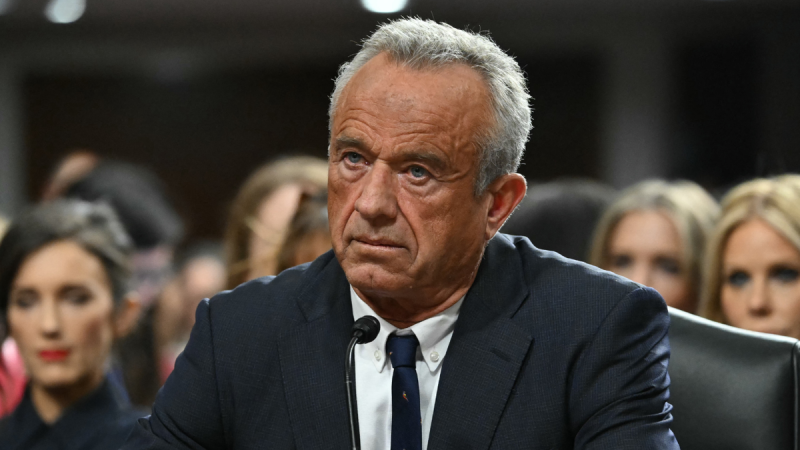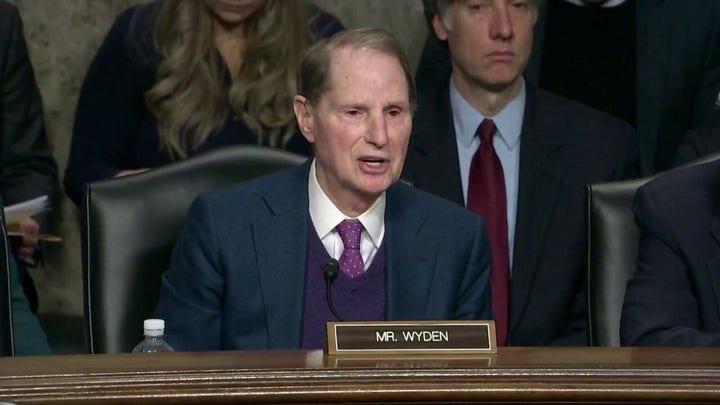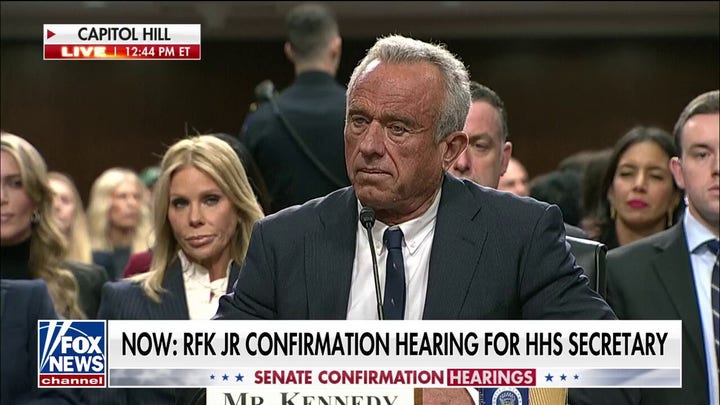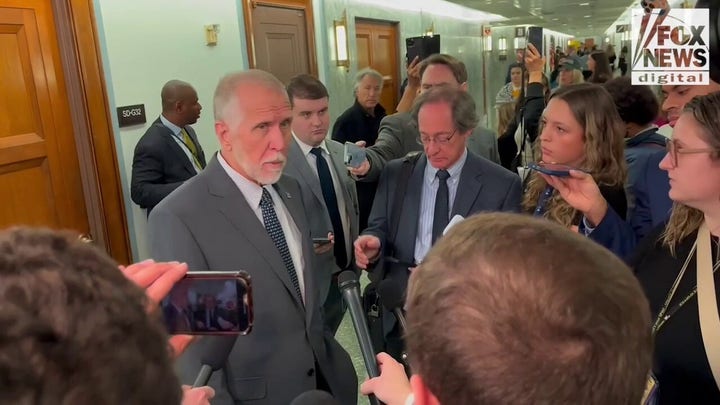
Robert F. Kennedy Jr., President Donald Trump’s nominee for secretary of the Department of Health and Human Services (HHS), is back on Capitol Hill for a second day of Senate confirmation hearings after a grilling by Democrats during a contentious first day on Wednesday.
Kennedy will take questions on Thursday in front of the Senate Health, Education, Labor and Pensions Committee.
On Wednesday, in front of the Senate Finance Committee, which will vote on Kennedy’s confirmation, there were plenty of verbal fireworks over past controversial comments by the vaccine skeptic and environmental crusader who ran for the White House in 2024 before ending his bid and endorsing Trump.
But Kennedy’s uneven performance didn’t appear to do damage to his confirmation, as no Republican on the panel voiced opposition to his nomination to lead 18 powerful federal agencies that oversee the nation’s food and health. Those agencies include the Centers for Disease Control and Prevention, the Food and Drug Administration, the National Institutes of Health, and the Centers for Medicare and Medicaid Services.
Democrats on the committee repeatedly pointed to Kennedy’s controversial vaccine views, including his repeated claims in recent years linking vaccines to autism, which have been debunked by scientific research.
They also spotlighted Kennedy’s service for years as chair or chief legal counsel for Children’s Health Defense, the nonprofit organization he founded that has advocated against vaccines and sued the federal government numerous times, including a challenge over the authorization of the COVID vaccine for children.
‘Mr. Kennedy has embraced conspiracy theories, quacks and charlatans, especially when it comes to the safety and efficacy of vaccines. He’s made it his life’s work to sow doubt and discourage parents from getting their kids life-saving vaccines,’ Sen. Ron Wyden of Oregon, the top Democrat on the panel, charged in his opening statement.
The senator also pointed to past Kennedy vaccine comments in podcasts, including one from 2020 when he said he would ‘pay anything’ to be able to go back in time and not vaccinate his kids.
‘Are you lying to Congress today when you say you are pro-vaccine? Or did you lie on all those podcasts?’ Wyden asked.
Pushing back in a heated exchange, Kennedy said the statements he made on podcasts have ‘been repeatedly debunked.’
And he vowed he would do nothing to prevent Americans from obtaining certain vaccines.
‘I support the measles vaccine. I support the polio vaccine. I will do nothing as HHS secretary that makes it difficult or discourages people from taking anything,’ Kennedy said.
Democrat Sen. Michael Bennet of Colorado accused Kennedy of ‘peddling half-truths, peddling false statements.’
And Democrat Sen. Sheldon Whitehouse of Rhode Island, who has known Kennedy for decades, dating back to their days as law school students and roommates at the University of Virginia, told his friend, ‘Frankly, you frighten people.’
Kennedy was also heckled multiple times near the start of the hearing.
As Kennedy delivered his opening comments and said, ‘News reports have claimed that I am anti-vaccine or anti-industry. I am neither. I am pro-safety,’ a protester shouted, ‘You lie.’
The heckler was led out of the hearing room by Capitol Police, as was a second protester minutes later.
And another protester was spotted in the audience holding a sign reading, ‘Vaccines Save Lives, No RFK JR.’
The 71-year-old Kennedy, a scion of the nation’s most storied political dynasty, launched a long-shot campaign for the Democrat presidential nomination against President Joe Biden in April 2023. But six months later, he switched to an independent run for the White House.
Kennedy made major headlines again last August when he dropped his presidential bid and endorsed Trump. While Kennedy had long identified as a Democrat and repeatedly invoked his late father, former Sen. Robert F. Kennedy, and his late uncle, former President John F. Kennedy – who were both assassinated in the 1960s – Kennedy in recent years built relationships with far-right leaders due in part to his high-profile vaccine skepticism.
Trump announced soon after the November election that he would nominate Kennedy to his Cabinet to run HHS.
In the two months since Trump’s announcement, it’s not just Democrats who’ve raised questions about Kennedy’s confirmation. Social conservative Republicans took issue with his past comments in support of abortion rights.
‘My belief is we should leave it to the woman. We shouldn’t have the government involved, even if it’s full term,’ Kennedy said as he ran for president.
But since endorsing Trump, Kennedy has walked back his stance on abortion. And in an exchange Wednesday with Democrat Sen. Maggie Hassan of New Hampshire, Kennedy said, ‘I agree with President Trump that every abortion is a tragedy.’
Independent Sen. Bernie Sanders of Vermont, a former two-time Democrat presidential candidate, argued that Kennedy made a ‘major U-turn’ on abortion.
Kennedy was also questioned about how he would reform Medicare and Medicaid, the massive government healthcare programs used by millions of older, disabled and low-income Americans.
‘I don’t have a broad proposal for dismantling the program,’ Kennedy said of Medicaid.
And he said Trump hadn’t asked him to cut the program but rather ‘asked me to make it better.’
Kennedy, whose outspoken views on Big Pharma and the food industry have also sparked controversy, vowed that ‘if confirmed, I will do everything in my power to put the health of Americans back on track.’
While Democrats may find common ground with Kennedy’s aim to shift the focus of the agencies he would oversee toward promotion of a healthy lifestyle, including overhauling dietary guidelines, taking aim at ultra-processed foods and getting to the root causes of chronic diseases, Kennedy lamented that they oppose him because he’s Trump’s nominee.
Now they’re against me because anything that President Trump does, any decision he makes, has to be lampooned, derided, discredited, marginalized, vilified,’ Kennedy said.
With Republicans controlling the Senate by a 53-47 majority, Kennedy can only afford to lose the support of three GOP senators if Democrats unite against his confirmation. During Wednesday’s hearing, no Republicans appeared to oppose the nomination.
Republican Sen. Thom Tillis of North Carolina appeared to lean into the Democrats’ attacks on Kennedy by asking, ‘I got a real quick question for you: Are you a conspiracy theorist?’
Kennedy answered that it ‘is a pejorative that’s applied to me mainly to keep me from asking difficult questions of powerful interests.’
GOP Sen. Steve Daines of Montana, a chemical engineer, noted that there were several Republican doctors on the committee.
‘We believe in science. I’m thankful that you do, too,’ Daines said.
Republican Sen. Bill Cassidy of Louisiana, a physician who said he had a ‘frank conversation’ with Kennedy about immunizations when they met this month, didn’t ask about vaccines during the committee hearing. Instead, he kept his questions about federal healthcare programs, including Medicare.
Meanwhile, GOP Sen. Ron Johnson of Wisconsin took aim at Democrats on the committee for what he claimed was ‘hostility on the other side. … I’m disappointed with it.’
Following Wednesday’s hearing, Democrats kept up their criticism.
‘I think you saw today that he’s not backing down from any of his really crazy, loony conspiracy beliefs,’ Sen. Chris Murphy of Connecticut told reporters.
And Sen. John Fetterman of Pennsylvania, who is thought to be one of the few Democrats who may support Kennedy’s confirmation, said, ‘I don’t think it went well for him.’
But GOP Sen. Roger Marshall of Kansas, who sits on the Finance Committee, pointed to Democrats on the panel and said, ‘I understand their concerns about vaccines. I think Bobby put those concerns to bed.’
And Republican Sen. Jim Banks of Indiana told reporters that Kennedy ‘did great today. I expect him to do great tomorrow.’


